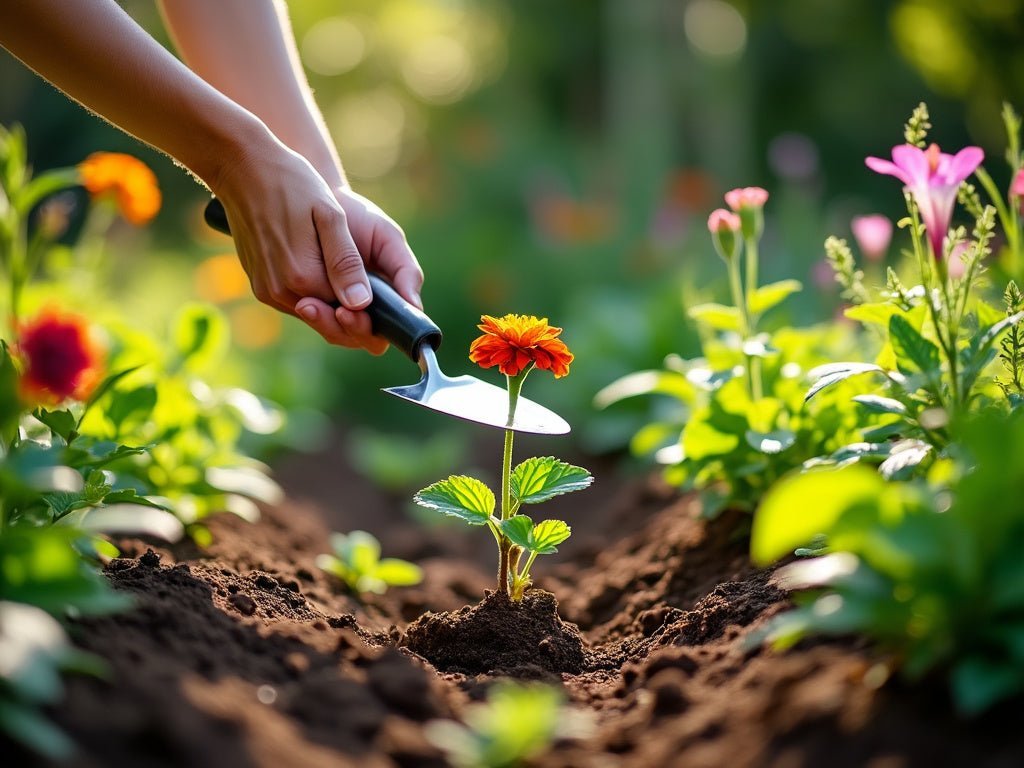
Transform Your Garden: 15 Mind-Blowing Sustainable Secrets for a Thriving Eco-Paradise
|
|
Time to read 4 min
|
|
Time to read 4 min
Table of contents
Sustainable gardening isn't just a trend—it's a necessity. As climate change looms, our gardens can become powerful tools for positive change. By adopting eco-friendly practices, we're not just growing plants; we're nurturing a healthier planet.
Let's start with the basics. Organic gardening is the cornerstone of sustainability. Ditch those synthetic fertilizers and pesticides. They're bad news for the environment and your health. Instead, embrace natural methods that work with nature, not against it.
Composting is your new best friend. It's like magic for your soil. Every 1kg of homemade compost saves over 0.1kg of fossil CO2 emissions. Plus, it's a great way to recycle kitchen scraps and yard waste.
Learn more about the benefits of composting
Water conservation is crucial. Install a rainwater harvesting system. It's not just good for your plants; it's great for your wallet too. You'd be amazed at how much water you can save.






Permaculture is like the Swiss Army knife of sustainable gardening. It's all about creating a self-sustaining ecosystem in your garden. Here's how to get started:
By following permaculture principles, you're not just gardening; you're creating a thriving mini-ecosystem.
Biodiversity isn't just a buzzword—it's the key to a resilient garden. Plant a mix of native and exotic species. This diversity attracts beneficial insects and creates a balanced ecosystem.
Let your lawn grow a bit wilder. Mow less frequently and watch as flowers bloom, providing nectar for pollinators. It's an easy way to support local wildlife.
Consider adding a small pond or water feature. It's not just pretty—it's a crucial habitat for various species.
Healthy soil is the secret sauce of sustainable gardening. Here's how to keep your soil happy:
Remember, good soil means healthy plants, which means fewer pests and diseases.
Forget harmful pesticides. Natural pest control is the way to go. Encourage beneficial insects like ladybugs and lacewings. They're nature's pest control squad.
Plant companion plants that naturally repel pests. Marigolds, for example, are great for keeping nematodes away from your tomatoes.
Choose sustainable materials for your garden structures. Bamboo is an excellent choice for raised beds or trellises. It's renewable, durable, and looks great.
Align your planting schedule with the seasons. It reduces the need for artificial heating or cooling and ensures your plants are in sync with natural cycles.
Use a planting calendar to keep track of what to plant when. It's a game-changer for efficient gardening.
Get creative with DIY projects that boost sustainability:
These projects are fun, eco-friendly, and can save you money.
Sustainable gardening is always evolving. Stay informed about new techniques and technologies. Vertical hydroponic systems and smart watering devices are just the beginning.
Remember, every small action counts. Your sustainable garden is part of a global movement towards a greener future.
Q: How long does it take to see results from sustainable gardening practices?
A: You can start seeing benefits within a single growing season, but the full impact on soil health and biodiversity may take 2-3 years to fully develop.
Q: Can I practice sustainable gardening in a small space or apartment?
A: Absolutely! Container gardening, vertical gardens, and even indoor herb gardens are great ways to practice sustainability in small spaces.
Q: Is sustainable gardening more expensive than traditional methods?
A: Initially, there might be some setup costs, but in the long run, sustainable gardening often saves money on water, fertilizers, and pest control.
Q: How can I attract beneficial insects to my garden?
A: Plant a variety of flowering plants, especially native species, and avoid using pesticides. Provide water sources and shelter like bug hotels.
Q: What's the best way to start composting if I'm a beginner?
A: Start with a simple bin system, focusing on a mix of green (nitrogen-rich) and brown (carbon-rich) materials. Keep it moist and turn regularly.
Sustainable gardening is more than just a hobby—it's a way to make a real difference. By implementing these practices, you're not just growing plants; you're cultivating a better future for our planet. Remember, every sustainable choice in your garden is a step towards a greener world. Let's get our hands dirty and grow a more sustainable future together!